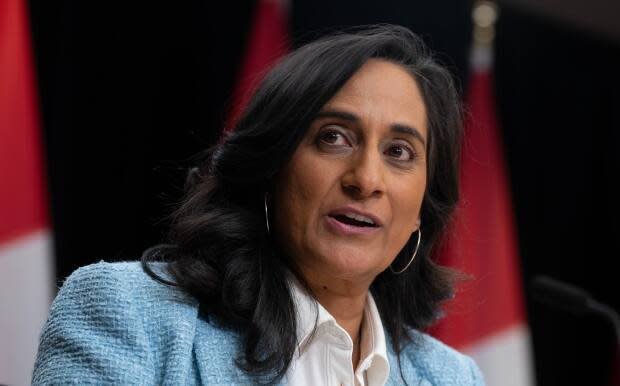Government hits Canada Life with financial sanctions

The federal government has begun imposing financial sanctions on Canada Life after months of outcry from public servants, retirees and their families who were left fighting for medical claims to be covered.
Public Services and Procurement Canada (PSPC) said it "is taking steps to address startup delays faced by Canada Life and has begun to apply financial consequence mechanisms under the contract," according to a statement from spokesperson Michèle LaRose.
She said PSPC is not yet in a position to share details about the nature of the sanctions.
On July 1, 2023, the federal government transferred responsibility for the public service health insurance plan from Sun Life to Canada Life.
The company had a six-month transitional period before the government could begin assessing the level of service, according to tendering documents for the $514-million contract.
For months, the federal government has repeatedly stated that it's prioritizing collaboration with Canada Life to improve service, before resorting to financial penalties or withholding payments.
During that time, CBC News heard from several members of the Public Service Health Care Plan (PSHCP) complaining of long waits, failing to get through to an agent and claims denied without explanation.
A spokesperson for the Professional Institute of the Public Service of Canada (PIPSC) said she hopes the sanctions will serve as a warning to motivate change, but said they're only a first stab at fixing what's wrong.
"These sanctions really are only to acknowledge the fact that Canada Life is not respecting its contract," said Stéphanie Montreuil.
"It is not compensating our members. It is not ensuring that there's a plan in place so that this does not continue to happen, so it really just is a start — and the bare minimum at that."
Canada Life says early challenges 'resolved'
A Canada Life spokesperson said on Wednesday that early challenges related to the transition "have been resolved."
"Canada Life is delivering benefits under this plan in Canada within expected service levels, including answering calls within 30 seconds and processing electronic claims within 1 day on average," the spokesperson wrote in an email.
The president of the Professional Association of Foreign Service Officers (PAPSO) said her members are frustrated and angry about delays in coverage outside Canada.
Pamela Isfeld welcomed the news of sanctions as "a positive step," but said the government is still responsible for actually fixing the underlying problem.
"As a taxpayer, I'm happy to learn that they are not going to continue to just keep paying this very lucrative contract, even when they're not receiving the service," she said.
"But as the representative of 2,000 foreign service officers here in Canada, we still have the same problem with the lack of an adequate health insurance plan, especially abroad and especially in the U.S. where the problems are the worst," Isfeld added.
"That still needs to be fixed."

Subcontractor MSH International handles the international side of the plan, including emergency travel coverage and comprehensive coverage.
As far as PSPC is concerned, though, the ultimate responsibility still rests with Canada Life.
"As the contractor for this project, Canada Life is responsible for ensuring that all deliverables set out in the contract are met, including work that is subcontracted out to other companies," LaRose said.
Struggle to get claims covered abroad
Isfeld said delays in processing member claims and those of family members are "enormous."
"In some cases, it's a question of large sums of money, and when the refund comes, there's just some amount in their bank account. It doesn't match the amount claimed and there's no explanation," she said in French.
That's what happened to Sonia Rioux, who lives in Europe with her military spouse. She was waiting for a refund for medical costs from a trip to Australia in July.
The couple was in a remote region preparing for a hiking excursion when Rioux began suffering abdominal pain. It was getting worse and worse, so she went to a clinic where nurses decided to send her to the closest hospital by air for an emergency operation.
She estimates the total cost at more than $8,000. It was the end of her trip — but only the beginning of her struggles with MSH International.

Rioux said she began her claim with MSH International at the end of August. In mid-April, she received a refund of about $2,000, without any clarity on which bill was being covered.
Rioux said she feels powerless and trapped because nothing she's tried seems to work, leaving her with "no escape."
"It becomes almost anxiety-inducing," she said in French. "I won't give up, but I find it exhausting."
Unions looking at legal remedies
PAFSO has decided to follow the example of the Public Service Alliance of Canada (PSAC) and study all possible legal remedies to force the government to provide a functioning health plan.
"It's the responsibility of the employer, and it's time they find a way to fulfil it," said Isfeld. "We haven't ruled out any legal options at this point. Everything is on the table."
PAFSO's lawyers are studying whether it would be possible to get a ruling forcing the government to put in place a temporary system that would allow employers to take out private insurance, she explained.
The union has also filed a policy grievance with the Treasury Board. The document obtained by Radio-Canada states that the switch to a new insurance provider violates the collective agreement because it "doesn't take account of the members' rights to a functioning health insurance system."
PSAC, Canada's largest public sector union, filed a similar grievance in February.
The two unions are demanding all affected public servants be compensated for the harm they've suffered including stress and pain, as well as financial losses.
PSAC national president Chris Aylward said in a written statement he encourages all its members to file individual grievances to put pressure on the employer.
Montreuil said PIPSC is now in the process of submitting a grievance.
Government 'working daily' with insurer
The federal government said it is still following up with Canada Life to ensure it meets its contractual obligations.
"We are working daily with Canada Life to make it understand that the company it subcontracted for international coverage must improve the situation and ensure that contractual obligations are respected to the letter," Treasury Board President Anita Anand said in a written statement.
"All public servants deserve the highest quality of service for their healthcare plans."

Treasury Board Secretariat spokesperson Joie Huynh noted that Canada Life has taken several measures to improve service since November, and that there have been "important improvements in wait times and processing delays."
She added that Canada Life is working with MSH International to put in place an action plan for international insurance coverage.
Employees of Global Affairs Canada who are living abroad can also count on interest-free cash advances from the government to cover medical costs until they can be refunded by MSH International.
A Canada Life spokesperson said in an email that the company working with MSH International and the federal government to improve the level of service for public servants and retirees living or travelling abroad.
MSH International's program delivery director, Jina Park, said the company has put in place measures to speed up processing times, reduce call centre wait times and prioritize urgent cases.
"We have doubled our claims processing capacity and continue to add more staff to meet demand that was higher than projected in the RFP," she wrote in an email.

